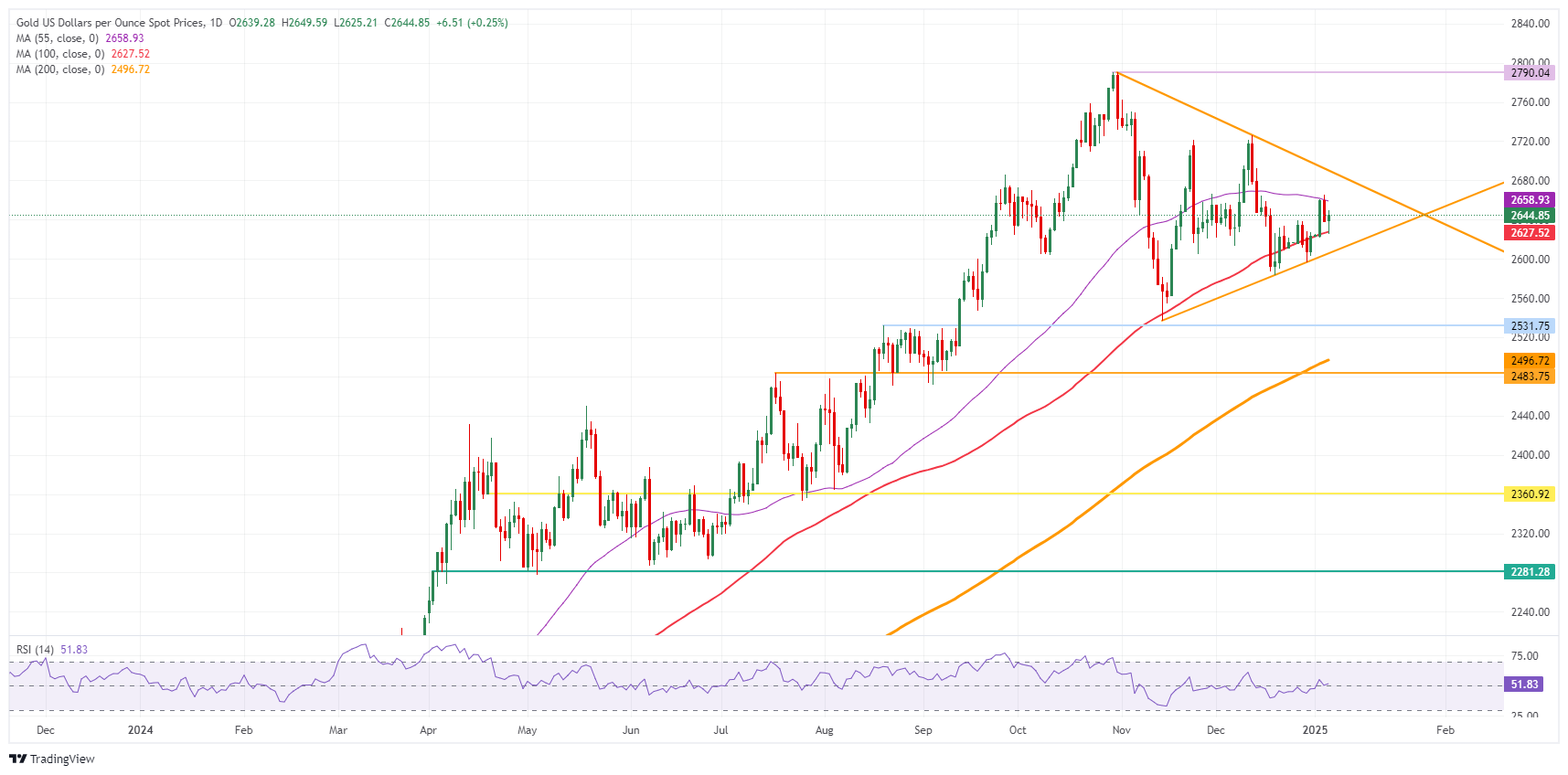Gold price stuck in consolidation while nervousness picks up towards Trump’s inauguration
- Markets are bouncing around after a quick surge in position last week.
- A Fed interest rate cut in January is mostly out of the cards at the moment.
- Gold price is stuck in a pennant technical formation as pressure builds for a breakout.
Gold’s price (XAU/USD) stabilizes near $2,640 on Monday after a quick sprint higher the first trading day of 2025 as traders were quite eager and quick to reopen their trimmed positions they had ahead of Christmas. Since then, Gold prices have started to soften a touch, despite US yields remaining rather elevated.
Although Gold prices might be consolidating, the number of moving parts on the geopolitical front is picking up. Italian Prime Minister Giorgia Meloni broke out of the European joint stance and visited President-elect Donald Trump on her own accord. Meanwhile, Canadian Prime Minister Justin Trudeau looks set to resign this week, according to Bloomberg News.
Daily digest market movers: Gold still has more room to consolidation
- According to the Washington Post President-elect Donald Trump is mulling to simplify its tariff approach by issuing a global tariff only on critical US imports.
- Markets are heading into the first normal trading week of 2025 with a very crammed economic calendar ahead, with the US Nonfarm Payrolls release on Friday as the focal point of the week.
- The US 10-year yield rallied to 4.639% last week, a fresh 7-month high. This Monday, it is settling down near 4.62%.
- The CME Fedwatch tool is currently only showing a small 10% chance for a 25 basis points (bps) interest rate cut in January. Further on, expectations are for the Fed to remain data-dependent with uncertainties that could influence the inflation path once President-elect Donald Trump takes office on January 20.
- Several European countries released their individual Purchasing Manager Indexes (PMIs) for the Services sector. France, Germany, and Spain saw a nice rebound, with some minor beats on expectations.
Technical Analysis: Gold stuck in broad consolidation
From a technical point of view, Gold price is stuck in a pennant chart formation as it respects an ascending and descending trend line. A breakout could be due at any time, although that is expected a bit later, with buyers and sellers being pushed towards each other.
On the downside, the 100-day Simple Moving Average (SMA) at $2,627is holding for now, although it is under pressure. The ascending trend line of the pennant pattern should provide support around $2,606 as it did in the past three occasions. In case that support line snaps, a quick decline to $2,531 could come back into play as support level.
On the upside, the 55-day SMA at $2,658 is the first level to beat. It will not be an easy task as it was already proved twice last week as a firm resistance. In case it breaks through, $2,690 will be the ultimate upside level in the form of the descending trendline in the pennant formation.
XAU/USD: Daily Chart
Gold FAQs
Gold has played a key role in human’s history as it has been widely used as a store of value and medium of exchange. Currently, apart from its shine and usage for jewelry, the precious metal is widely seen as a safe-haven asset, meaning that it is considered a good investment during turbulent times. Gold is also widely seen as a hedge against inflation and against depreciating currencies as it doesn’t rely on any specific issuer or government.
Central banks are the biggest Gold holders. In their aim to support their currencies in turbulent times, central banks tend to diversify their reserves and buy Gold to improve the perceived strength of the economy and the currency. High Gold reserves can be a source of trust for a country’s solvency. Central banks added 1,136 tonnes of Gold worth around $70 billion to their reserves in 2022, according to data from the World Gold Council. This is the highest yearly purchase since records began. Central banks from emerging economies such as China, India and Turkey are quickly increasing their Gold reserves.
Gold has an inverse correlation with the US Dollar and US Treasuries, which are both major reserve and safe-haven assets. When the Dollar depreciates, Gold tends to rise, enabling investors and central banks to diversify their assets in turbulent times. Gold is also inversely correlated with risk assets. A rally in the stock market tends to weaken Gold price, while sell-offs in riskier markets tend to favor the precious metal.
The price can move due to a wide range of factors. Geopolitical instability or fears of a deep recession can quickly make Gold price escalate due to its safe-haven status. As a yield-less asset, Gold tends to rise with lower interest rates, while higher cost of money usually weighs down on the yellow metal. Still, most moves depend on how the US Dollar (USD) behaves as the asset is priced in dollars (XAU/USD). A strong Dollar tends to keep the price of Gold controlled, whereas a weaker Dollar is likely to push Gold prices up.

